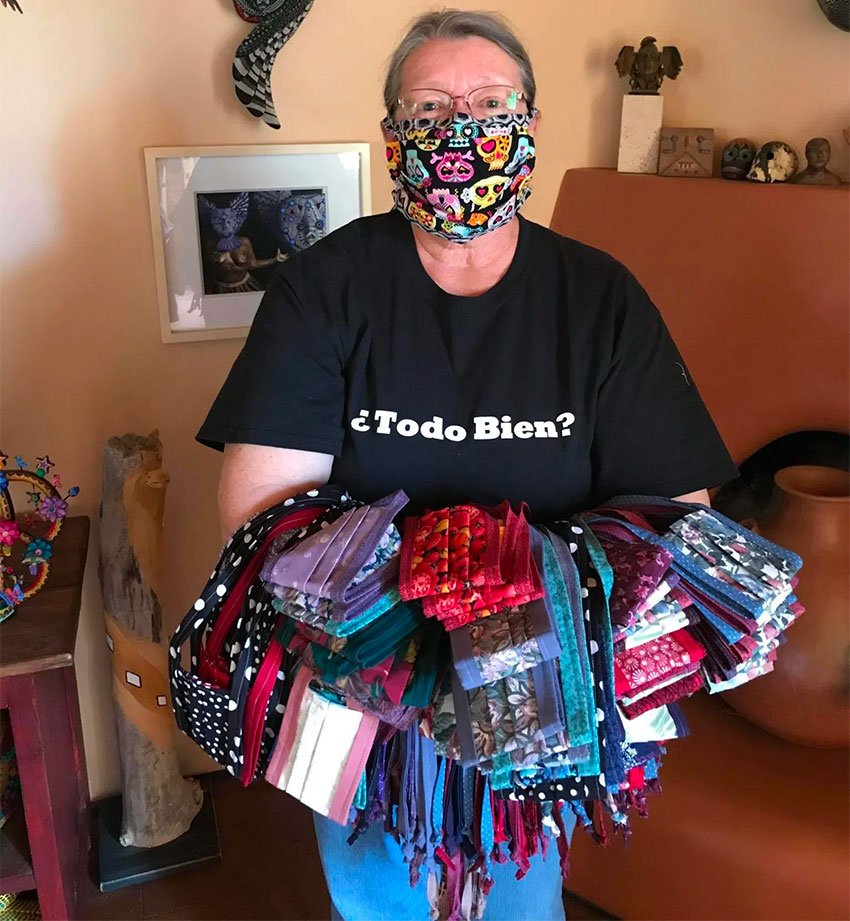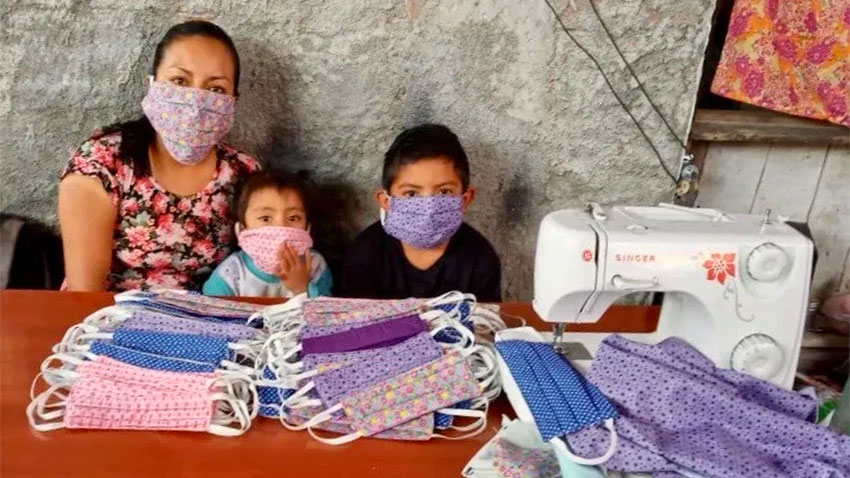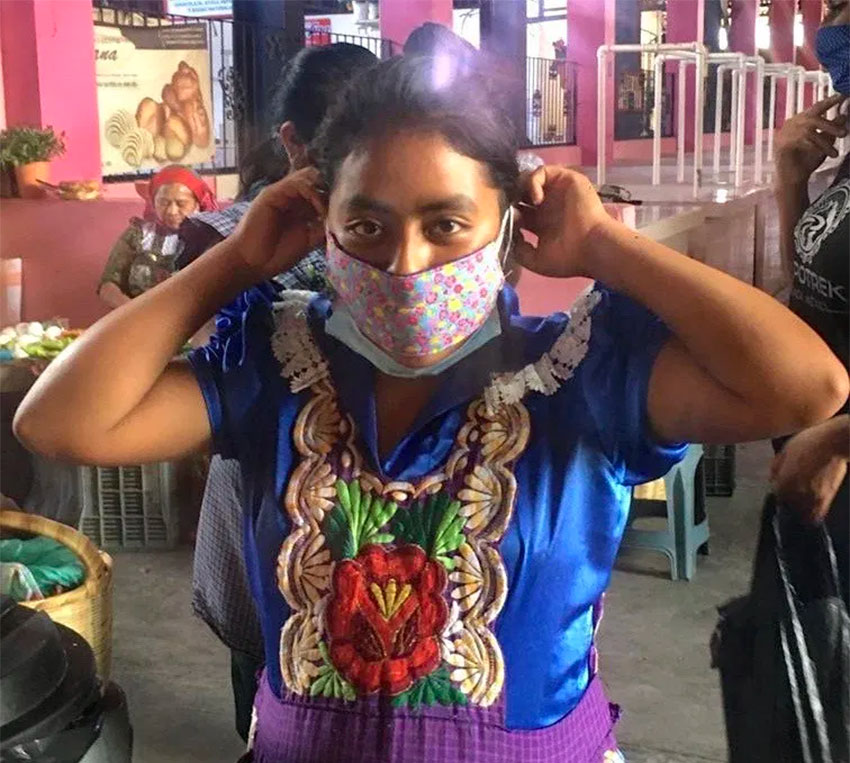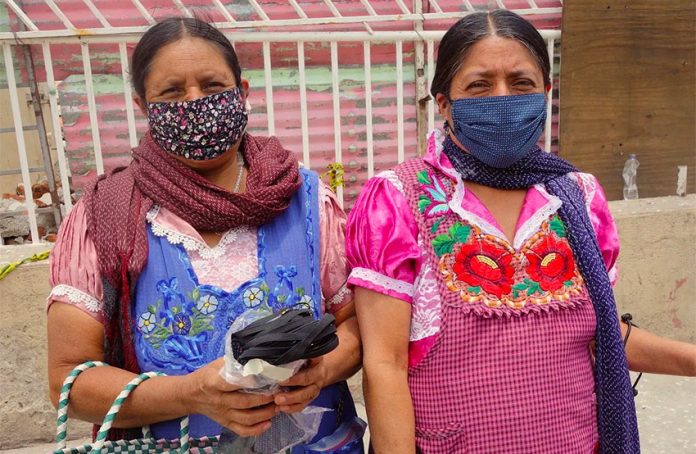As the pandemic raced around the globe, Norma Schafer watched the effects in Teotitlán del Valle, a small pueblo outside Oaxaca city, with growing alarm.
The small rural community, known for its beautiful rug weaving, is steeped in tradition and a simple way of life. The state of Oaxaca is full of tiny villages like this.
“It was early March, and people were starting food banks,” said Norma. “So many people were unemployed, lined up and waiting for food … it occurred to me there would be a need in Oaxaca for masks.”
A self-described textile lover and collector who sews, knits, quilts and dyes her own fabrics naturally, Norma has lived in Teotitlán del Valle since 2007 and been active within the community to support and promote their ancient arts. Making masks seemed like the natural way for her to help.
She saw that a few local seamstresses were making masks to sell, and had the idea to raise money to fund these women, giving them a source of income while also providing much-needed masks in Oaxaca city. Norma wanted to get the masks to “regular” people: street vendors, shoppers at the mercados, small store owners.

The first challenge, strangely enough, was finding the right fabric. Tightly woven 100% cotton is not common in Mexico, and traditional manta is too porous to be effective. Eventually she connected with Pátzcuaro resident Cherie Verber, who had a source for quilting cotton. And as her network of friends in the U.S. heard about what she was doing, many offered either to send fabric or make masks and send those.
Working with two countries – the U.S. and Mexico – Norma began organizing.
“I call myself a Mask Jockey,” she said. “It’s a question of production and distribution, figuring out who has the highest need when, and where the next batch should go.”
Norma sent a pattern to all the sewers, wherever they were, and provided materials to those in Oaxaca. Her goal was to enlist helpers and get masks to the many villages around Oaxaca city. She knew they’d need hundreds of masks – which would be distributed free — plus money to pay local people to hand them out. But she quickly realized something else was needed.
“Many people here don’t believe there’s a virus,” she said. “It’s something they can’t see. Many are uneducated and poor and need to continue working to feed their families. Most have no savings to carry them through.”
So she created informative hang-tags that are pinned to each mask, in Spanish and the indigenous Zapotec language, explaining why it’s vital to use the mask to prevent the spread of infection and save lives.

“We can’t force people to wear them,” she said. “Some people are older and superstitious of anything that reeks of government intervention. Our help has no judgment. We just have to understand, and know that we’re not going to win every single battle.”
Donations started coming in. Other expats jumped in to help. One passed out masks to farmers and field workers whose livelihoods have been devastated because of restaurants closing. In Teotítlan, resident Cristy Molina has four local seamstresses making masks, which she delivers to tiny villages around the city.
Tlacolula tour operator Eric Ramírez found a seamstress to make 200 masks and then distributed them in the local market. Another tour operator, Alvin Starkman, took 300 masks to mezcal makers in remote villages. Retired journalist Gail Pellett mobilized her seamstress and got masks on every taxi driver who entered or left the small town of San Agustin Etla where she lives.
In New Mexico, Karen Nein made 200 masks that Norma sent to San Martín Tilcajete, a small village known for making traditional alejibres, carved and painted phantasmagorical creatures. Hundreds of masks were sent to an Episcopal church to distribute to people who live in the dump in Zaachila, 30 minutes outside the city. In the city itself, Kalisa Wells is the point person, receiving shipments of masks and fabric at her centrally located home, where other volunteers can easily pick them up.
By April, Norma felt like “command central.” And by May 20, the tally was impressive: almost 20 volunteers making masks in two countries; 10 people organizing local seamstresses and distributing the masks in 17 different villages and Oaxaca city. A total of 2,480 masks had been made and distributed, and more than US $6,000 donated.
“We can touch so many with so little!” said Norma, who added that a donation of $25 will buy and distribute 10 masks with hang-tags. “And with the dollar even stronger and the peso much weaker, this support goes a long way. I would encourage readers to find a place in Mexico they can support, a family they can support directly, an organization that is feeding people.”

As this story was being written, coronavirus cases were soaring in Oaxaca and the state’s Health Minister warned that an even bigger increase is expected in October. Although many small villages have shut themselves off to non-residents, the tiny town of Maquilxochitl announced its first case May 19.
“This is not over; another wave is coming,” said Norma. She’s continuing to monitor public health in Oaxaca and her village, and has partnered with two other organizations to include mask distribution along with despensas (bags of food basics).
“As we say in Mexico, vamos a ver [we shall see].”
• For information and updates about the Oaxaca Mask Project: http://oaxacaculture.com
• To donate: www.paypal.me/oaxacaculture
Janet Blaser is a frequent contributor to Mexico News Daily. She lives in Mazatlán.
